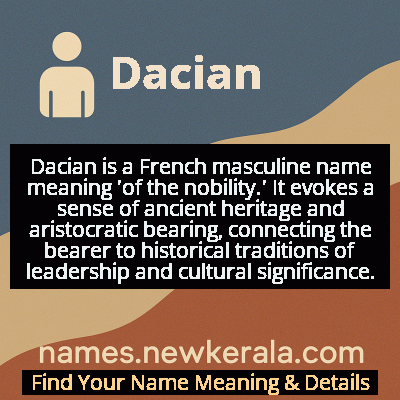Dacian Name Meaning & Details
Origin, Popularity, Numerology Analysis & Name Meaning of Dacian
Discover the origin, meaning, and cultural significance of the name DACIAN. Delve into its historical roots and explore the lasting impact it has had on communities and traditions.
Name
Dacian
Gender
Male
Origin
French
Lucky Number
5
Meaning of the Name - Dacian
Dacian is a French masculine name meaning 'of the nobility.' It evokes a sense of ancient heritage and aristocratic bearing, connecting the bearer to historical traditions of leadership and cultural significance.
Dacian - Complete Numerology Analysis
Your Numerology Number
Based on Pythagorean Numerology System
Ruling Planet
Mercury
Positive Nature
Adventurous, dynamic, curious, and social.
Negative Traits
Restless, impatient, inconsistent, prone to indulgence.
Lucky Colours
Green, white.
Lucky Days
Wednesday.
Lucky Stones
Emerald.
Harmony Numbers
1, 3, 9.
Best Suited Professions
Sales, marketing, travel, entertainment.
What People Like About You
Versatility, charisma, adventurous spirit.
Famous People Named Dacian
Dacian Cioloș
Politician
Former Prime Minister of Romania and European Commissioner for Agriculture
Dacian Varga
Footballer
Romanian professional footballer who played for teams including CFR Cluj and Rapid București
Dacian Kligman
Film Director
Romanian film director known for 'The Japanese Dog' and other acclaimed works
Name Variations & International Equivalents
Click on blue names to explore their detailed meanings. Gray names with will be available soon.
Cultural & Historical Significance
In French context, the name gained popularity through historical connections and religious veneration. Saint Dacian was a 4th-century Roman official who became a Christian martyr, and his story spread throughout medieval Europe. The name embodies a sense of ancient nobility, cultural pride, and historical continuity, representing a bridge between classical antiquity and modern European identity. It carries connotations of strength, tradition, and cultural heritage that have maintained its appeal across centuries.
Extended Personality Analysis
Individuals named Dacian are often perceived as possessing a natural nobility and dignified presence that commands respect. They typically exhibit strong leadership qualities, intellectual depth, and a profound sense of cultural awareness. Dacians tend to be principled individuals with a clear moral compass, demonstrating loyalty to their heritage and values while maintaining an open-minded approach to different perspectives.
Their personality often combines traditional wisdom with contemporary adaptability, making them effective in bridging old and new ideas. Dacians are frequently described as resilient, determined, and possessing inner strength reminiscent of their ancient namesakes. They value knowledge, history, and cultural preservation, often showing interest in genealogy, anthropology, or historical studies. While they can be reserved initially, they form deep, lasting relationships and are known for their reliability and commitment to those they care about.
Modern Usage & Popularity
In contemporary usage, Dacian remains a distinctive and relatively uncommon name, primarily found in Romanian communities and among families with Eastern European heritage. While not among the most popular names in France or other Western European countries, it has maintained a steady presence as a choice for parents seeking a name with historical depth and cultural significance. The name has seen occasional resurgence during periods of renewed interest in ancient history and cultural identity movements. Its usage reflects a preference for names that convey strength, tradition, and connection to European roots without being overly common.
Symbolic & Spiritual Meanings
Symbolically, Dacian represents the enduring legacy of ancient civilizations and the continuity of cultural identity through time. It embodies the concept of noble heritage, suggesting both the responsibility and privilege that comes with historical legacy. The name carries metaphorical meanings of resilience and cultural preservation, symbolizing the ability to maintain identity and values despite external pressures and changing circumstances. It also represents the bridge between ancient wisdom and modern relevance, suggesting that timeless qualities of leadership, integrity, and cultural pride remain valuable across generations.

